Interviews by Mandy Thompson with photos by Tifaine Rutherford
A number of local journalists last week attended a four-day workshop hosted by the University of Guyana’s Centre for Communication Studies, the Institute for International Journalism of Ohio University’s Scripps College of Communication and the United States Embassy in Georgetown. Held at Moray House under the theme ‘Democracy, Reporting and Responsibility: Fundamentals for an Informed Society,’ the workshop catered for entry level and mid-career journalists as well as those who needed refresher training.
We asked participants about their thoughts on the workshop; what they would have learned and how they would apply it to their jobs. We also asked the facilitators for their thoughts. Their comments follow:
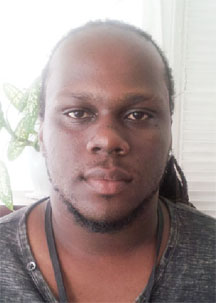 Jonathan Craig, National Communication Network (NCN) Linden – ‘All the sessions were informative and I learned a lot because when I first started in the media I was just thrown out there without no training or anything. This is like an eye opener. Some days you would be sitting like there are no stories available. Now I know I can look at so many stories in so many different angles so it becomes easier.’
Jonathan Craig, National Communication Network (NCN) Linden – ‘All the sessions were informative and I learned a lot because when I first started in the media I was just thrown out there without no training or anything. This is like an eye opener. Some days you would be sitting like there are no stories available. Now I know I can look at so many stories in so many different angles so it becomes easier.’
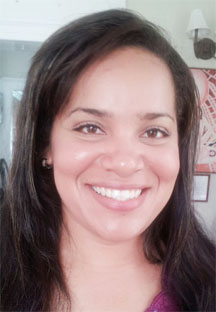 Suelle Findlay-Williams, Public Relations Officer of the Ministry of Education – ‘I think it offered how to present simple stories and how to focus on people. Sometimes we forget the human side of stories and we look forward to the big stories like accidents and murders and I welcome the perspective of focusing on people and making them the centre. I like the discussion on democracy and politics. I think that is an area we struggle to report effectively on. I also like the fundamentals of TV reporting and also writing. I think from this I will change my view of how I look at people and how I look at stories. It was refreshing to me.’
Suelle Findlay-Williams, Public Relations Officer of the Ministry of Education – ‘I think it offered how to present simple stories and how to focus on people. Sometimes we forget the human side of stories and we look forward to the big stories like accidents and murders and I welcome the perspective of focusing on people and making them the centre. I like the discussion on democracy and politics. I think that is an area we struggle to report effectively on. I also like the fundamentals of TV reporting and also writing. I think from this I will change my view of how I look at people and how I look at stories. It was refreshing to me.’
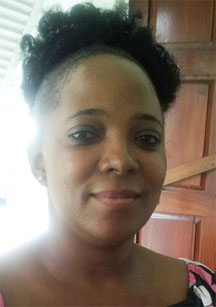 Carolyn Walcott, Director of the University of Guyana (UG) Centre for Communication– ‘I think the depth of knowledge and attendance was encouraging. Because we recognised that not every reporter will come into our classroom, this is our way of reaching out to the media. I feel encouraged by the attendance and I’m looking forward to facilitating many more of these workshops.’
Carolyn Walcott, Director of the University of Guyana (UG) Centre for Communication– ‘I think the depth of knowledge and attendance was encouraging. Because we recognised that not every reporter will come into our classroom, this is our way of reaching out to the media. I feel encouraged by the attendance and I’m looking forward to facilitating many more of these workshops.’
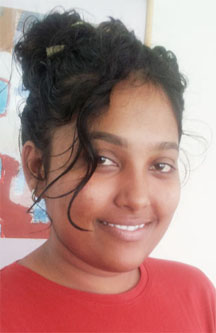 Anadia Holladar, Producer NCN – ‘I think the excellent thing about the workshop is that it posed a great opportunity for representatives from various media houses to examine what it is they have been doing, compare it against the fundamentals and see where we lack so we would be better able to produce and report. I was interested in all the topics that were taught particularly investigative reporting, democracy and politics. I think they raised a lot of issues on the international scene that would make reporters in Guyana think about the way we do things; see what we can do to make it more interesting and gain more listenership. This was a great initiative and very inspiring.’
Anadia Holladar, Producer NCN – ‘I think the excellent thing about the workshop is that it posed a great opportunity for representatives from various media houses to examine what it is they have been doing, compare it against the fundamentals and see where we lack so we would be better able to produce and report. I was interested in all the topics that were taught particularly investigative reporting, democracy and politics. I think they raised a lot of issues on the international scene that would make reporters in Guyana think about the way we do things; see what we can do to make it more interesting and gain more listenership. This was a great initiative and very inspiring.’
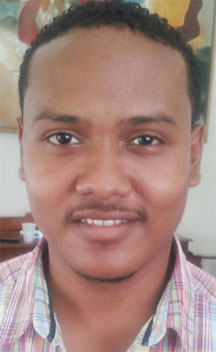 Mark Murray, Capitol News – ‘When I heard about it I was thinking along the lines of another workshop that’s gonna be kinda boring but I’m speaking out because in the end I learned something. I found this workshop very useful and interactive. I think the way in which it was done is commendable. I think as a television newsperson I can see myself making a lot of changes when it comes to my daily package and the way stuff is presented to the public. I have a better understanding of what I think the public would want to know and how they can be informed and educated at the same time.’
Mark Murray, Capitol News – ‘When I heard about it I was thinking along the lines of another workshop that’s gonna be kinda boring but I’m speaking out because in the end I learned something. I found this workshop very useful and interactive. I think the way in which it was done is commendable. I think as a television newsperson I can see myself making a lot of changes when it comes to my daily package and the way stuff is presented to the public. I have a better understanding of what I think the public would want to know and how they can be informed and educated at the same time.’
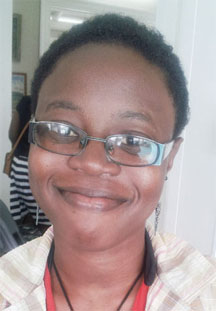 Neketa Forde, Communication Student at UG – ‘It was fun and it kept me awake; I wasn’t expecting that piece. It was very informative in terms of how to deal with politics and how to manoeuvre around your editors. The television aspect was informative in terms of the shots, the length and natural sound. I have used natural sound in some of my features but in the demonstration I was shown how effectively it can impact the story.’
Neketa Forde, Communication Student at UG – ‘It was fun and it kept me awake; I wasn’t expecting that piece. It was very informative in terms of how to deal with politics and how to manoeuvre around your editors. The television aspect was informative in terms of the shots, the length and natural sound. I have used natural sound in some of my features but in the demonstration I was shown how effectively it can impact the story.’
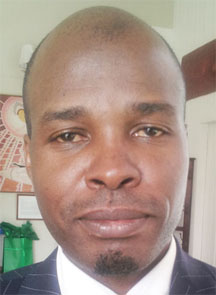 Andrew Weekes, Head of Guyana News Network – ‘I think it’s good food for thought. The programmes and techniques they talked about in terms of the new media I think that is a great concern. We in Guyana don’t have a code of ethics per se, we only have a code of ethics when it comes to elections. We need to get that done. We got to understand in terms of reporting [that] you don’t have to let the minister speak all the time, let the people speak. I think it’s a good way of bringing the media operatives here on par with what is happening around the world.’
Andrew Weekes, Head of Guyana News Network – ‘I think it’s good food for thought. The programmes and techniques they talked about in terms of the new media I think that is a great concern. We in Guyana don’t have a code of ethics per se, we only have a code of ethics when it comes to elections. We need to get that done. We got to understand in terms of reporting [that] you don’t have to let the minister speak all the time, let the people speak. I think it’s a good way of bringing the media operatives here on par with what is happening around the world.’
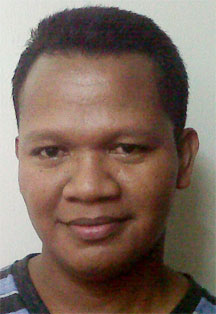 Alva Solomon, Reporter at Demerara Waves – ‘I have been in the news for like five years now and these workshops usually help reporters especially if you are young and don’t have enough background and training. It has helped me in a lot of ways because I didn’t know much about the fundamentals in journalism and I have learned a lot. I am going to use this in my reporting career.’
Alva Solomon, Reporter at Demerara Waves – ‘I have been in the news for like five years now and these workshops usually help reporters especially if you are young and don’t have enough background and training. It has helped me in a lot of ways because I didn’t know much about the fundamentals in journalism and I have learned a lot. I am going to use this in my reporting career.’
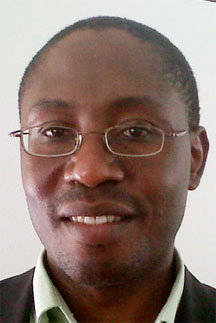 Dr Yusuf Kalyango, Director at Ohio University Scripps College of Communication – ‘I think that there is that desire to be more professional and ethical. But I also learned that there are challenges and also cultural impediments within the organisations. I think what we have seen is that journalism demands that they can have ways in communicating with our editors and also if the editors are willing to communicate with the policy makers I think things will start changing for the better. But I think the most important thing is the media here are vibrant and are growing and are getting better. There are young journalists here who have the drive and the desire to push the editors a lot. I think what we need right now is to connect that to the masses to buy into your work. I plan to continue interacting with some of the journalists here.’
Dr Yusuf Kalyango, Director at Ohio University Scripps College of Communication – ‘I think that there is that desire to be more professional and ethical. But I also learned that there are challenges and also cultural impediments within the organisations. I think what we have seen is that journalism demands that they can have ways in communicating with our editors and also if the editors are willing to communicate with the policy makers I think things will start changing for the better. But I think the most important thing is the media here are vibrant and are growing and are getting better. There are young journalists here who have the drive and the desire to push the editors a lot. I think what we need right now is to connect that to the masses to buy into your work. I plan to continue interacting with some of the journalists here.’
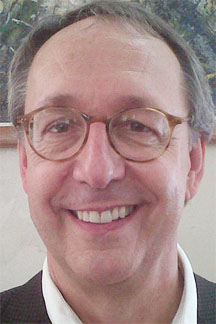 Andy Alexander, former Washington Post Ombudsman – ‘The first thing that I thought and I found heartening was that so many people showed up and they seemed eager to learn. It’s a little bit risky when people like me come from a place like the United States where the media are more developed. The temptation is to be frustrated by democracies that are not as fully developed. But what we found here was that people really wanted to learn, they wanted to grow and my overall impression of the press here is the journalists may be a little bit ahead of the owners in some ways. They are more eager to engage in the necessary discourse between the government and the media. They have a very good understanding that they as journalists are representing the people’s interests.’
Andy Alexander, former Washington Post Ombudsman – ‘The first thing that I thought and I found heartening was that so many people showed up and they seemed eager to learn. It’s a little bit risky when people like me come from a place like the United States where the media are more developed. The temptation is to be frustrated by democracies that are not as fully developed. But what we found here was that people really wanted to learn, they wanted to grow and my overall impression of the press here is the journalists may be a little bit ahead of the owners in some ways. They are more eager to engage in the necessary discourse between the government and the media. They have a very good understanding that they as journalists are representing the people’s interests.’
